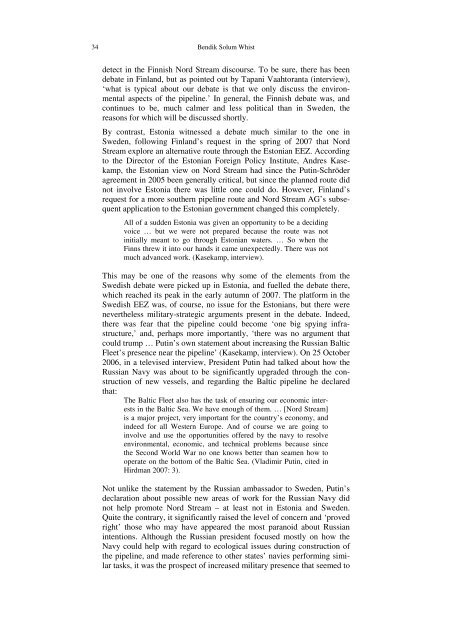Nord Stream: Not Just a Pipeline
Nord Stream: Not Just a Pipeline
Nord Stream: Not Just a Pipeline
Create successful ePaper yourself
Turn your PDF publications into a flip-book with our unique Google optimized e-Paper software.
34 Bendik Solum Whist<br />
detect in the Finnish <strong>Nord</strong> <strong>Stream</strong> discourse. To be sure, there has been<br />
debate in Finland, but as pointed out by Tapani Vaahtoranta (interview),<br />
‘what is typical about our debate is that we only discuss the environmental<br />
aspects of the pipeline.’ In general, the Finnish debate was, and<br />
continues to be, much calmer and less political than in Sweden, the<br />
reasons for which will be discussed shortly.<br />
By contrast, Estonia witnessed a debate much similar to the one in<br />
Sweden, following Finland’s request in the spring of 2007 that <strong>Nord</strong><br />
<strong>Stream</strong> explore an alternative route through the Estonian EEZ. According<br />
to the Director of the Estonian Foreign Policy Institute, Andres Kasekamp,<br />
the Estonian view on <strong>Nord</strong> <strong>Stream</strong> had since the Putin-Schröder<br />
agreement in 2005 been generally critical, but since the planned route did<br />
not involve Estonia there was little one could do. However, Finland’s<br />
request for a more southern pipeline route and <strong>Nord</strong> <strong>Stream</strong> AG’s subsequent<br />
application to the Estonian government changed this completely.<br />
All of a sudden Estonia was given an opportunity to be a deciding<br />
voice … but we were not prepared because the route was not<br />
initially meant to go through Estonian waters. … So when the<br />
Finns threw it into our hands it came unexpectedly. There was not<br />
much advanced work. (Kasekamp, interview).<br />
This may be one of the reasons why some of the elements from the<br />
Swedish debate were picked up in Estonia, and fuelled the debate there,<br />
which reached its peak in the early autumn of 2007. The platform in the<br />
Swedish EEZ was, of course, no issue for the Estonians, but there were<br />
nevertheless military-strategic arguments present in the debate. Indeed,<br />
there was fear that the pipeline could become ‘one big spying infrastructure,’<br />
and, perhaps more importantly, ‘there was no argument that<br />
could trump … Putin’s own statement about increasing the Russian Baltic<br />
Fleet’s presence near the pipeline’ (Kasekamp, interview). On 25 October<br />
2006, in a televised interview, President Putin had talked about how the<br />
Russian Navy was about to be significantly upgraded through the construction<br />
of new vessels, and regarding the Baltic pipeline he declared<br />
that:<br />
The Baltic Fleet also has the task of ensuring our economic interests<br />
in the Baltic Sea. We have enough of them. … [<strong>Nord</strong> <strong>Stream</strong>]<br />
is a major project, very important for the country’s economy, and<br />
indeed for all Western Europe. And of course we are going to<br />
involve and use the opportunities offered by the navy to resolve<br />
environmental, economic, and technical problems because since<br />
the Second World War no one knows better than seamen how to<br />
operate on the bottom of the Baltic Sea. (Vladimir Putin, cited in<br />
Hirdman 2007: 3).<br />
<strong>Not</strong> unlike the statement by the Russian ambassador to Sweden, Putin’s<br />
declaration about possible new areas of work for the Russian Navy did<br />
not help promote <strong>Nord</strong> <strong>Stream</strong> – at least not in Estonia and Sweden.<br />
Quite the contrary, it significantly raised the level of concern and ‘proved<br />
right’ those who may have appeared the most paranoid about Russian<br />
intentions. Although the Russian president focused mostly on how the<br />
Navy could help with regard to ecological issues during construction of<br />
the pipeline, and made reference to other states’ navies performing similar<br />
tasks, it was the prospect of increased military presence that seemed to













